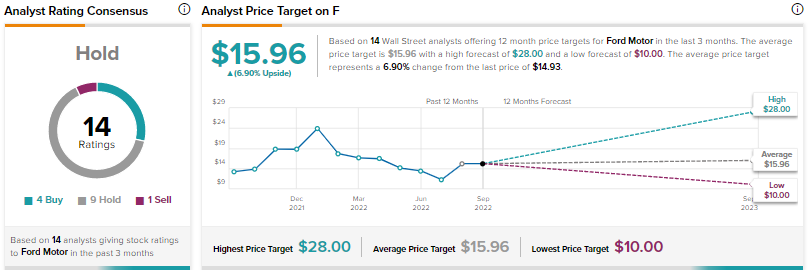Auto giant Ford Motor’s (NYSE:F) latest financial update clearly reflected the impact of inflationary pressures and supply chain bottlenecks. The company warned investors that it would incur $1 billion in additional supplier costs in the third quarter due to inflation. Ford also revealed that it expects to include 40,000 to 45,000 vehicles in inventory at the end of Q3 due to a shortage of certain parts.
Claim 50% Off TipRanks Premium
- Unlock hedge fund-level data and powerful investing tools for smarter, sharper decisions
- Stay ahead of the market with the latest news and analysis and maximize your portfolio's potential
Ford shares declined 4.4% in Monday’s extended trading session following the update. The stock has declined nearly 30% year-to-date.
Ford Keeps Full-Year Guidance Intact Despite Q3 Pressures
Taking into account the higher-than-anticipated costs, Ford now expects its Q3 adjusted EBIT (Earnings before Interest and Taxes) in the range of $1.4 billion to $1.7 billion. The company expects vehicles in the Q3 inventory due to parts shortage to be completed and sold to dealers in the fourth quarter. Accordingly, Ford expects a shift in some revenue and EBIT in Q4.
The company highlighted that vehicles that faced component shortages in Q3 included “high-demand, high-margin models” of its popular trucks and SUVs. Back in July, rival General Motors (GM) disclosed that it had nearly 95,000 vehicles in its inventory due to a semiconductor shortage and a lack of certain other components. GM stated that it expects to record revenue on these vehicles in the second half of 2022 as and when they are delivered to dealers.
On the positive side, Ford reaffirmed its full-year adjusted EBIT outlook of $11.5 billion to $12.5 billion despite higher costs and disruptions faced in Q3. Ford is scheduled to announce its Q3 results on October 26.
Ford’s second-quarter results crushed analysts’ expectations driven by strong execution amid tough business conditions and a favorable mix of higher-margin products.
What is Ford’s Stock Prediction?
Recently, Bank of America Securities analyst John Murphy reduced his price target for Ford stock to $28 from $32 but maintained a Buy rating. Murphy believes that the macro backdrop has become a “greater risk” and that supply chain woes could continue to impact auto volumes into 2023. The analyst lowered his sales estimates and price targets across his auto coverage and expects the next peak in auto demand to occur in 2028 rather than 2025.
Meanwhile, the Street remains on the sidelines on Ford, with four Buys, nine Holds, and one Sell rating. The average Ford price target of $15.96 implies 6.9% upside potential from current levels.

Conclusion
Supply chain disruptions continue to impact the ability of Ford and other automakers to meet demand. Further, inflation is hitting profitability. The analyst community continues to be cautious about Ford due to persistent near-term headwinds.
















